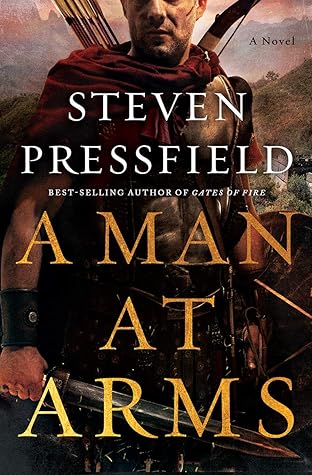More on this book
Community
Kindle Notes & Highlights
The Romans possessed might beyond measure. They held wealth and skill and knowledge of science and the arts. But before all these they owned order.
Here, the youth thought, stands a man whose feet are planted in the real world, not the sphere of dreams or delusion. Here is a man who fears death, as all do, and perhaps due to his vast experience of war reckons even more keenly the mysteries of fate and chance and destiny, yet who faces these down every day and bears the scars to prove it. This man seeks not some sphere beyond the mortal or the mundane but instead dwells in this world of dust and strife, without illusion or self-delusion. David knew at once that he would follow this man. What he taught, David would learn. What he commanded,
...more
David resolved that he would give all he had, and all he ever would have, to acquire that which this man-at-arms possessed—this wisdom, this understanding, the knowledge of these mysteries. He would die to be and to become, himself, like this man.
‘The foe sending scouts believes he spies upon us. But it is we who spy upon him,’ Caesar explained to his officers. ‘I fear the enemy only when I cannot see him. So long as he remains close, I rest at ease.’
The youth fought to bring his mind to focus upon what he must do now, to be still and to look out.
“Who are all of you?” the man-at-arms cried. “And how, by the sunless track to hell, has my life become so entangled with yours?”
“Have you any notion what ‘zeal’ means, boy? Kana’ut in our tongue. It means love of God. It means passion for the right. Kana’ut is soul! It is that without which a man is nothing.
“Let me guess,” said Michael, facing the man-at-arms directly. “You have donated every copper you’ve earned—and to those as could neither make return or care to.”
You step into that moment—‘beneath extinction’s scythe,’ as the poet says—having accepted, even embraced, your own death in advance and willingly offering this up. This is what makes you unkillable. Call me out if I speak false.”
“Brother, I believe that you, in battle, offer your life to the one who stands unseen and unborn within you. I mean that self you will become. You want to die. Tell the truth. Only then may you become that which, within you, yearns desperately to be born.”
“What is belief, Michael? Does one ‘believe in’ the sun? The seasons? Even this flesh we inhabit? Belief is not necessary for these. Their reality is self-evident. Belief is only needed for that which does not exist.”
When he did not, the Nazarene cleared his throat. “And what of worlds beyond this?” “There are no worlds beyond this.”
“Eris?” “Strife. All things are born in strife, even the earth itself, and all are extinguished in strife.”
“There is another world,” he said, “not ‘above’ this one but within it. In this world, all souls are linked by the commonality of their identity as children of God. In this world, care for others, even the humblest—especially the humblest—is the medium by which one may transcend that philosophy of isolation and despair which you so eloquently espouse.”
“That day,” Michael said, “I encountered him who had perished, whom the Romans had crucified, whom his own devotees had enshrouded and entombed.
I saw him again, in form as flesh and blood. His eyes held mine, his voice spoke to me, his hands held mine. He was alive. I saw it.”
‘I am a friend,’ the man said, ‘of those to whom you have tendered refuge. I wish to thank you, Timothy, on their behalf, for your courage and your kindness.’ “The man came up directly before me. His eyes were dark and filled with such compassion as I have never seen before or since. ‘Do not fear,’ the man said. I knew without speech that he, like me and those of my vision, had experienced crucifixion and had been transformed by it.
Paul wrote, in the girl’s recitation, that he knew the members of the fledgling church were under extraordinary duress. He implored them to be true to the spirit of hope and faith and love that had led them to hazard everything to follow the man they called their savior. For without such transcendent love, nothing else was possible, nor indeed could any other thought or action possess meaning.
And though I have the gift of prophecy, and understand all mysteries, and all knowledge; and though I have all faith, so that I could remove mountains, and have not charity, I am nothing.”
“Charity suffereth long, and is kind; charity envieth not; charity vaunteth not itself, is not puffed up. Doth not behave itself unseemly, seeketh not her own, is not easily provoked, thinketh no evil . . . Charity beareth all things, believeth all things, hopeth all things, endureth all things.”
“For now we see through a glass darkly; but then face to face; now I know in part; but then shall I know even as I am known. And now abideth faith, hope, and charity, these three; but the greatest of these is charity.” − 46 − CROSSROADS “REMAIN WITH US,” SIMON PLEADED.
The last that the lady, or the community entire, beheld of Telamon and Ruth was the pair striking off together with the first glimmers of dawn settling lightly upon their shoulders.


